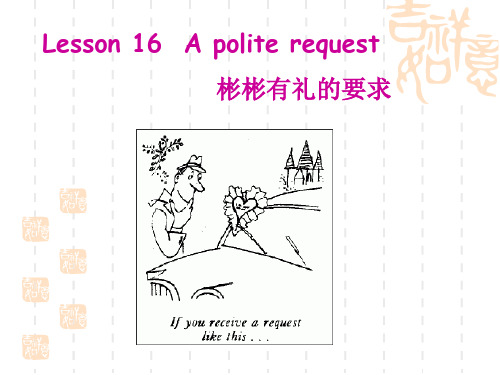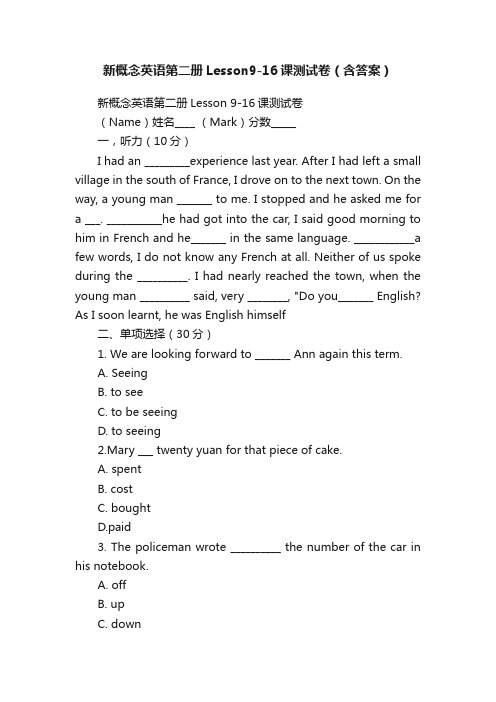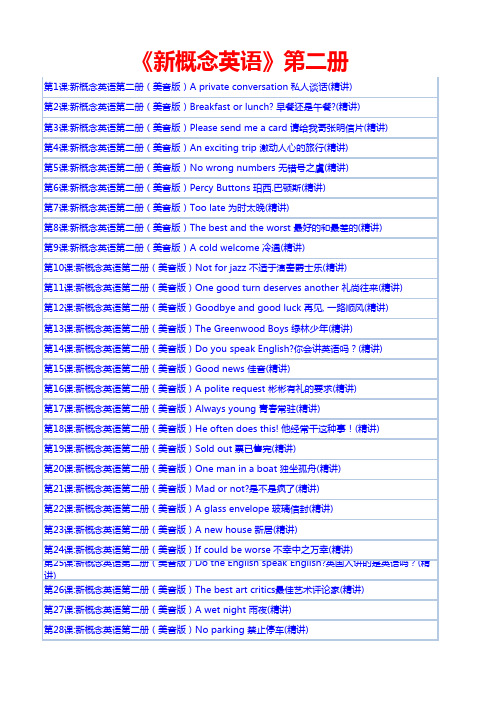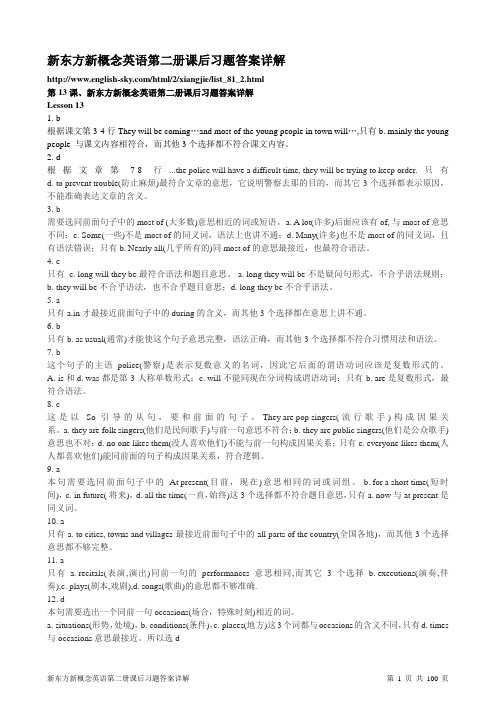新概念英语第二册第16课
新概念第二册第16课 (共44张PPT)

吧
• let alone 更不必说
• He hasn’t enough money for food, let alone amusements.
• 他连吃饭钱都不够,就更不用说有 钱玩了。
• on my car • 指车的外面 • welcome sb. to +地点 • 欢迎某人来某地
• note
• 1) 便条 • 2)笔记; 注释
• He left a note on my desk.
– 他在我桌上留了张字条。
• take/ make notes of ... • I didn't take any notes. • 3) 音调 (tone) • There is a note of anxiety in her voice. • message 消息
三种条件句(Conditionals)
• 1 Zero conditional
• 用法:表示某事是普遍的真理或事 实
• If I invest my money, it will grow.
• 结构:if 从句(现在时)+ 主句 (将来 时)
• 记忆点:主将从现
• = My money will grow if I invest it.
• Her income was barely enough to maintain one child, let alone three.
• 她的收入养活1个孩子都几乎不够 ,更不用说3个了。
• 其后若接动词,通常与前面相关动词形 式相同。如:
• The baby can’t even sit up yet, let alone walk!
新概念英语第二册课件Lesson16(共14张PPT)

New words and expressions
★note n. 便条 m• essage:消息 note:纸条,纸钞 make notes:做笔记 ★area n. 地段 area:场地,地段(一块对方) place:地点 region:地区(交战,开火)
In this region, there were a lot of wars. ★sign n. 指示牌 ★reminder n. 提示 remind v.:提示,提醒
Comprehension questions
• 6.Where were you spending a holiday? • In Sweden. • 7.What did you find on your car? • A note. • 8.Did it welcome you ti the city? • Yes, it did. • 9.Were you in a ‘No parking’ area? • Yes, I was. • 10.What did the note ask you to pay attention to? • To the street signs.
新概念英语2第二册第16课Lesson 16 A polite request 课件

高峰时间交通十分繁忙。
however
• 表示转折关系的连词(和but类似) e.g. I feel a little tired. However, I can hold on.
我感觉到有点儿累了,但我能坚持下去。 e.g. She felt ill. However, she went to work.
那边有个停车场。 e.g. The city covers an area of 15 square kilometers.
这个城市的面积为15平方公里。
sign
• n. 标语,告示,记号,信号 e.g. The sign before the building said: “No
smoking.” 楼前的牌子上写着“禁止吸烟”
sign 地段 n.
reminder
fail
指示牌 n.
obey
提示 n.
无视,忘记 v.
服从 v.
park
• n. 公园 e.g. We were playing in the park. • v. 停车,停放(车辆) e.g. Don’t park the car in this street.
候
▪ Remember me to your mother. 代我向 请求,要求。 e.g. He made a request that I should help him.
他要求我帮助他。
e.g. It’s my last request, I’ll never ask you anything again. 这是我最后的请求,我再也不会向你提出任何要求
新概念英语第二册Lesson9-16课测试卷(含答案)

新概念英语第二册Lesson9-16课测试卷(含答案)新概念英语第二册Lesson 9-16课测试卷(Name)姓名____ (Mark)分数_____一,听力(10分)I had an _________experience last year. After I had left a small village in the south of France, I drove on to the next town. On the way, a young man _______ to me. I stopped and he asked me for a ___. ___________he had got into the car, I said good morning to him in French and he_______ in the same language. ____________a few words, I do not know any French at all. Neither of us spoke during the __________. I had nearly reached the town, when the young man __________ said, very ________, "Do you_______ English? As I soon learnt, he was English himself二、单项选择(30分)1. We are looking forward to _______ Ann again this term.A. SeeingB. to seeC. to be seeingD. to seeing2.Mary ___ twenty yuan for that piece of cake.A. spentB. costC. boughtD.paid3. The policeman wrote __________ the number of the car in his notebook.A. offB. upC. downD. of4. —I’m afraid I’ve broken the window.—________, I can easily get it fixed.A. Not at allB. Never mindC. What a pityD. How dare you5. When he arrived, we ________ at the office.A. have workedB. were workingC. had been workingD. had worked6. It was fifteen _______eleven.A. passB. pastC. passedD. pasted7. My sister is sleeping. Could you ______the radio?A. turn onB. turn upC. turn overD. turn down8. We should not refuse____others who are in troubleA helpingB to helpC helpedD to hurt9. After hearing the ____news, I was ___A shocking shockedB shocked shockedC shocking shocking10. He said he was ___of his son who saved a girl’s lifeA prideB touchedC proudD proud of11. __some occasions, we should wear properlyA inB onC atD of12. The foods were forbidde n. He wasn’t ____to eat themA leftB letC allowed D. aloud13.The ball reminded me ___my dead dogA toB ofC onD in14. He answered these questions by ____his head.A. to nodB. nodding C nod D. to nodding15. The children are standing _______the starting line and are ready ______run.A at; toB at; for C. in; to D. in;for16. It was an___ story. I was ____ at itA funny amusedB amusing interestedC amusing amusedD amusing touched17. Grandmother is ill. We must_______ a doctor.A. send awayB. send offC. send forD.send of18. ---There isn’t ________ water here. Could you get_____for me?--All right.A. some;anyB. any; anyC. any; some d. some; some19. Everyone went to the park ___TomA apart fromB exceptC besideD besides20. ---_______did Aunt Lucy come?---By train.A. WhenB. HowC. WhyD. Where21. Breakfast is the first ______ of the day.A.foodB. dinnerC. lunchD. meal22. What he said makes me ____a lot.A. thinkB. thinkingC.to thinkD. thought23. _______ the hot weather, he couldn't sleep indoors.A.BecauseB. Because ofC. AsD. For24. It was so expensive that we cannot ____to buy itA allowB obeyC affordD remind25. The teacher will not let anyone leave the classroom until the bell _____.A. ringsB. rangC. will ringD. would ring26. Don’t _____others when they are talkingA allowB interruptC forbidD afford27.______will you come back? --------In two daysA How farB How longC How soonD How often28._______have you been in China?------I have been here for two yearsA How farB How longC How soonD How often29.________do you go to your uncle’s--------once a monthA How farB How longC How soonD How often30._______, he went to work by carA keep orderB suddenlyC As usualD apart from三、用所给单词适当形式填空(20分)1.The people(strike) the clock just now.2.The bridge(build) in 1942.3.Tom lent me one of his books. Tom lent me a book of (he)4.Tony (go)into the restaurant when the writer was having dinner .5.Tony ( work )at the bank since three years ago .6.He has not yet returned. He (return) in ten minutes.7.If it (not rain)__________tomorrow, we will go to have a picnic.8.When we (go)____ to beijing next year, we will visit Peking University .9.My mother said the earth (move)_________around the sun(现在).10.Miss Wang has (go)______to America, but I don’t knowwhen he will come back.11.During the holiday, there are ____ ____ ____ ____people on the street.(一大群)12.We should _____ ______other s’ money on time (归还)13A man waved his hand and asked for ____ ___(搭车)14._____ ______a few words of French, I can’t speak in French at all.(除了)四、首字母填空(10分)Look at the child over there.H______name is Jim Green.He is an English b___.He is myn_______friend.M______name is Liu Ying.This is o______school.It's No.2 Middle S_______.My father is a t_______at the school. Jim is eleven .I'm twelve.He is in C_______Two.We are in thes________class.We like our school v_____much五、完形填空(10分)Mr White works in an office. He liked reading in bed when he was at school. It was bad for his 1 and now he has near sight ( 近视). But he wouldn’t want 2 to know about it and he never wears a pair of glasses. It often 3 him some trouble. One winter morning he was sent to a village school on business (出差). He 4 a bus at a stop in a small town. Then he had to walk there. The road to the village wasn’t smooth (平坦). He fell over some times and it 5 his clothes dirty. 6 he got to the village. Suddenly it began to blow and it got colder. He was looking for the school while his 7 was blown off. He began to run after it but he couldn’t get it. He couldn’t understand why his hat ran into a house as if (似乎) it had 8 . And he ran into the house, 9 . A woman stopped him and shouted angrily, “ 10 are you running after my hen (母鸡)for?”1. A. ears B. nose C. Mouth D. eyes2. A. anybody else B. nobody C. woman D. somebody3. A. follows B. takes C. brings D. carries4. A. took off B. got off C. got on D. came on5. A. let B. made C. Gave D. felt6. A. At first B. At home C. At times D. At last7. A. clothes B. bag C. Hat D. glasses8. A. legs B. hands C. shoes D. arms9. A. always B. also C. Either D. too10. A. What B. Why C. Which D. Who六、阅读理解(20分)Passage A阅读理解If you know me well, you know I don't like birthday parties. At least, I don't like birthday parties given for me. I enjoy them when they are for other people, but when they are for me, I just don't like them.I remember one birthday party some friends of mine had for me when I was a student at the university. Of course, I had told my best friend Henry that I didn't want a party and I made him promise he wouldn't do anything. He agreed. I should have known better than to believe him.On the day of my birthday, we got home from school at about, oh, I don't know, three or half past three. We went inside and as usual I went into the bathroom and started to close the door when suddenly from behind the shower curtain (浴帘), a kind of strange female(女) voice started singing, “Happy birthday to you, happy birthday to you.”And then from all over the room, people joined in. There were about fifteen people hiding everywhere in the room.They had got my roommate's key and got in earlier. They had all planned to come out of the hiding place just at the same time while singing. I guess I really upset their plans by going in just to wash my hands.根据文章内容,选择正确答案:1.Which of the following sentences is NOT true?A. I got home from school at 3 or 3:30 on the day of my birthday.B. I dislike birthday parties held for me.C. Henry agreed that he would not do anything on my birthday.D. I knew there were some of my friends hiding in my room.2. What did my friends plan to do?A. They planned to leave the room as soon as possible.B. They planned to sing as loudly as they could.C. They planned to eat in the bathroom.D. They had planned to come out of hiding places together.Passage B阅读理解An old friend from California called from the airport to tell me that he had arrived. I was not able to leave the office, but I had made plans for his arrival. After explaining (解释) where my new house was, I told him that I had left the key under the doormat (门垫). Since I knew it would be pretty late before I could get home, I suggested that he make himself at home and help himself to anything that was in the refrigerator(电冰箱).Two hours later my friend phoned me from the house. At the moment, he said, he was listening to some of my records after having had a delicious meal. Now, he said, he was drinking a glass of orange juice. When I asked him if he had had any difficultyfinding the house, he answered that the only problem was that he had not been able to find the key under the doormat, but luckily, the living room window by the apple tree had been left open and he had climbed in through the window. I listened to all this in great surprise. There is no apple tree outside my window, but there is one by the living room window of my next door neighbor's house!根据文章内容,选择正确答案:3. An old friend of mine called ______.A. to tell me to meet him at the airportB. to tell me about his arrivalC. to ask me to leave the officeD. to ask me to make plans for his arrival4. My friend climbed into the room because ______ .A. there was an apple tree outsideB. the living room window was left openC. he had difficulty opening the doorD. he hadn't found the key5. My friend telephoned me two hours later ______ .A. from my homeB. at the airportC. in his officeD. from my neighbor's housePassage CThere is a new park near Andy's home. It's fine today. Andy and his family are in the park now. On their left, there is a cafe. On their right, there is a big lake. There are many flowers and trees around the lake. There's a small hill behind the lake. Near the lake, there are two signs. One says, "Don't swim in the lake!"The other says, "No fishing!" But you can go boating on the lake.There is a beautiful garden in the middle of the park. There is green grass and beautiful flowers in it. There are some small shops between the lake and the garden. The park is so nice. Andy and his family like it very much.6. The park near Andy's home is __________.A. new and beautifulB. old and beautifulC. clean and newD. old and clean7. Is there a cafe in the park? __________.A. Yes, there isn't.B. No, there isn't.C. Yes, there is.D. No, there is.8. People can _______ on the lake. A. swim B. fish C. boat D. play9. The shops in the park are not_________. A. small B. big C. good D. pretty10. Do Andy and his family like the park?____________.A. Yes, they don't.B. No, they do.C. Yes, very much.D. No, they don't.第9-16课测试卷答案一.听力1-5 amusing waved lift As soon as replied6-10 Apart from journey suddenly slowly speak二.1-5 ADCBB 6-10 BDBAC 11-15 BCBBA 16-20 CCCBB 21-25DABCA 26-30 BCBDC三.1-5 struck was built his went has worked6-10 will return doesn’t rain go moves gone11-13 a large crowd of pay back a lift Apart from四.1-5 His boy new My our 6-10 school teacher Class same very 五.1-5 DACBB 6-10 DCADA六.Passage1 DD Passage2 BDD passage3 ACCBC。
《新概念英语》第二册 电子版

《新概念英语》第二册第1课:新概念英语第二册(美音版)A private conversation 私人谈话(精讲)第2课:新概念英语第二册(美音版)Breakfast or lunch? 早餐还是午餐?(精讲)第3课:新概念英语第二册(美音版)Please send me a card 请给我寄张明信片(精讲)第4课:新概念英语第二册(美音版)An exciting trip 激动人心的旅行(精讲)第5课:新概念英语第二册(美音版)No wrong numbers 无错号之虞(精讲)第6课:新概念英语第二册(美音版)Percy Buttons 珀西.巴顿斯(精讲)第7课:新概念英语第二册(美音版)Too late 为时太晚(精讲)第8课:新概念英语第二册(美音版)The best and the worst 最好的和最差的(精讲)第9课:新概念英语第二册(美音版)A cold welcome 冷遇(精讲)第10课:新概念英语第二册(美音版)Not for jazz 不适于演奏爵士乐(精讲)第11课:新概念英语第二册(美音版)One good turn deserves another 礼尚往来(精讲)第12课:新概念英语第二册(美音版)Goodbye and good luck 再见, 一路顺风(精讲)第13课:新概念英语第二册(美音版)The Greenwood Boys 绿林少年(精讲)第14课:新概念英语第二册(美音版)Do you speak English?你会讲英语吗?(精讲)第15课:新概念英语第二册(美音版)Good news 佳音(精讲)第16课:新概念英语第二册(美音版)A polite request 彬彬有礼的要求(精讲)第17课:新概念英语第二册(美音版)Always young 青春常驻(精讲)第18课:新概念英语第二册(美音版)He often does this! 他经常干这种事!(精讲)第19课:新概念英语第二册(美音版)Sold out 票已售完(精讲)第20课:新概念英语第二册(美音版)One man in a boat 独坐孤舟(精讲)第21课:新概念英语第二册(美音版)Mad or not?是不是疯了(精讲)第22课:新概念英语第二册(美音版)A glass envelope 玻璃信封(精讲)第23课:新概念英语第二册(美音版)A new house 新居(精讲)第24课:新概念英语第二册(美音版)If could be worse 不幸中之万幸(精讲)第25课:新概念英语第二册(美音版)Do the English speak English?英国人讲的是英语吗?(精讲)第26课:新概念英语第二册(美音版)The best art critics最佳艺术评论家(精讲)第27课:新概念英语第二册(美音版)A wet night 雨夜(精讲)第28课:新概念英语第二册(美音版)No parking 禁止停车(精讲)第29课:新概念英语第二册(美音版)Taxi! 出租汽车(精讲)第30课:新概念英语第二册(美音版)Football or polo? 足球还是水球?(精讲)第31课:新概念英语第二册(美音版)Success story 成功者的故事(精讲)第32课:新概念英语第二册(美音版)Shopping made easy 购物变得很方便(精讲)第33课:新概念英语第二册(美音版)Out of the darkness 冲出黑暗(精讲)第34课:新概念英语第二册(美音版)Quick work 破案 “神速”(精讲)第35课:新概念英语第二册(美音版)Stop thief!捉贼!(精讲)第36课:新概念英语第二册(美音版)Across the Channel 横渡海峡(精讲)第37课:新概念英语第二册(美音版)The Olympic Games 奥林匹克运动会(精讲)第38课:新概念英语第二册(美音版)Everything except the weather 唯独没有考虑到天气(精讲第39课:新概念英语第二册(美音版)Am I all right? 我是否痊愈?(精讲)第40课:新概念英语第二册(美音版)Food and talk 进餐与交谈(精讲)第41课:新概念英语第二册(美音版)Do you call that a hat? 你把那个叫帽子吗?(精讲)第42课:新概念英语第二册(美音版)Not very musical 并非很懂音乐(精讲)第43课:新概念英语第二册(美音版)Over the South Pole 飞越南极(精讲)第44课:新概念英语第二册(美音版)Through the forest 穿过森林(精讲)第45课:新概念英语第二册(美音版)A clear conscience 问心无愧(精讲)第46课:新概念英语第二册(美音版)Expensive and uncomfortable 既昂贵又受罪(精讲)第47课:新概念英语第二册(美音版)A thirsty ghost 嗜酒的鬼魂(精讲)第48课:新概念英语第二册(美音版)Did you want to tell me something? 你想对我说什么吗?第49课:新概念英语第二册(美音版)The end of a dream 美梦告终(精讲)第50课:新概念英语第二册(美音版)Taken for a ride 乘车兜风(精讲)第51课:新概念英语第二册(美音版)Reward for virtue 对美德的奖赏(精讲)第52课:新概念英语第二册(美音版)A pretty carpet 漂亮的地毯(精讲)第53课:新概念英语第二册(美音版)Hot snake 触电的蛇(精讲)第54课:新概念英语第二册(美音版)Sticky fingers 粘糊的手指(精讲)第55课:新概念英语第二册(美音版)Not a gold mine 并非金矿(精讲)第56课:新概念英语第二册(美音版)Faster than sound! 比声音还快!(讲解)第57课:新概念英语第二册(美音版)Can I help you, madam? 您要买什么,夫人?(精讲)第58课:新概念英语第二册(美音版)A blessing in disguise? 是因祸得福吗?(精讲)第59课:新概念英语第二册(美音版)In or out? 进来还是出去?(精讲)第60课:新概念英语第二册(美音版)The future 卜算未来(精讲)第61课:新概念英语第二册(美音版)Trouble with the Hubble 哈勃望远镜的困境(讲解)第62课:新概念英语第二册(美音版)After the fire 大火之后(精讲)第63课:新概念英语第二册(美音版)She was not amused 她并不觉得好笑(精讲)第64课:新概念英语第二册(美音版)The Channel Tunnel 海峡隧道(精讲)第65课:新概念英语第二册(美音版)Jumbo versus the police 小象对警察(精讲)第66课:新概念英语第二册(美音版)Sweet as honey! 像蜜一样甜!(精讲)第67课:新概念英语第二册(美音版)Volcanoes 火山(精讲)第68课:新概念英语第二册(美音版)Persistent 纠缠不休(精讲)第69课:新概念英语第二册(美音版)But not murder!并非谋杀!(精讲)第70课:新概念英语第二册(美音版)Red for danger 危险的红色(精讲)第71课:新概念英语第二册(美音版)A famous clock第72课:新概念英语第二册(美音版)A car called bluebird第73课:新概念英语第二册(美音版)The record-holder第74课:新概念英语第二册(美音版)Out of the limelight第75课:新概念英语第二册(美音版)SOS第76课:新概念英语第二册(美音版)April Fools Day第77课:新概念英语第二册(美音版)A successful operation第78课:新概念英语第二册(美音版)The last one?第79课:新概念英语第二册(美音版)By air第80课:新概念英语第二册(美音版)The Crystal Palace第81课:新概念英语第二册(美音版)Escape第82课:新概念英语第二册(美音版)Monster or fish?第83课:新概念英语第二册(美音版)After the elections第84课:新概念英语第二册(美音版)On strike第85课:新概念英语第二册(美音版)Never too old to learn第86课:新概念英语第二册(美音版)Out of control第87课:新概念英语第二册(美音版)A perfect alibi第88课:新概念英语第二册(美音版)Trapped in a mine第89课:新概念英语第二册(美音版)A slip of the tongue 第90课:新概念英语第二册(美音版)What第91课:新概念英语第二册(美音版)Three men in a basket 第92课:新概念英语第二册(美音版)Asking for trouble第93课:新概念英语第二册(美音版)A noble gift第94课:新概念英语第二册(美音版)Future champions第95课:新概念英语第二册(美音版)A fantasy第96课:新概念英语第二册(美音版)The dead return。
新东方新概念英语第二册课后习题答案详解

新东方新概念英语第二册课后习题答案详解/html/2/xiangjie/list_81_2.html第13课、新东方新概念英语第二册课后习题答案详解Lesson 131. b根据课文第3-4行They will be coming…and most of the young people in town will…,只有b. mainly the young people 与课文内容相符合,而其他3个选择都不符合课文内容。
2. d根据文章第7-8行...the police will have a difficult time, they will be trying to keep order.只有d. to prevent trouble(防止麻烦)最符合文章的意思,它说明警察去那的目的,而其它3个选择都表示原因,不能准确表达文章的含义。
3. b需要选同前面句子中的most of (大多数)意思相近的词或短语。
a. A lot(许多)后面应该有of, 与most of 意思不同;c. Some(一些)不是most of 的同义词,语法上也讲不通;d. Many(许多)也不是most of 的同义词,且有语法错误;只有b. Nearly all(几乎所有的)同most of 的意思最接近,也最符合语法。
4. c只有 c. long will they be 最符合语法和题目意思。
a. long they will be 不是疑问句形式,不合乎语法规则;b. they will be 不合乎语法,也不合乎题目意思;d. long they be 不合乎语法。
5. a只有a.in才最接近前面句子中的 during 的含义,而其他3个选择都在意思上讲不通。
6. b只有b. as usual(通常)才能使这个句子意思完整,语法正确,而其他3个选择都不符合习惯用法和语法。
7. b这个句子的主语police(警察)是表示复数意义的名词,因此它后面的谓语动词应该是复数形式的。
新概念英语2第16课 NCE2_Lesson16

car park: 停车场(BrE.) No parking: 禁止停车 e.g. Can I park my suitcase here? 我能把我的手提箱放在这儿么?
★traffic n. 交通
条件状语从句时态要求:
IF-从句中的动词用一般现在时态,主句中的动词用一般将来时 态.主句和从句的位置可以互换:
eg. If he is out , I’ll call tomorrow. 改错:
If he will have time,he will come. If he has time, he will come. He will get there in time if he will runs. He’ll get there in time if he runs.
★reminder n. 提示
remind v.:提示,提醒 remind sb of sth 提醒某人某事 remind sb to do sth提醒某人做某事 An older photo can remind me of my childhood. You remind me of your mother. Please remind her to come earlier tomorrow.
sb. is allowed to do sth. • let sb. do sth. (通常不用于被动语态)
1. 我们不允许大家在教室里吸烟。 We don’t allow people to smoke in the classroom.
2. 我会让你用我的字典的。 I will let you use my dictionary.
逐句精讲新概念英语第二册第十六课 彬彬有礼的要求

逐句精讲新概念英语第二册:第十六课彬彬有礼的要求Lesson 16 A polite request课文内容:If you park your car in the wrong place, a traffic policeman will soon find it. You will be very lucky if he lets you go without a ticket. However, this does not always happen. Traffic police are sometimes very polite. During a holiday in Sweden, I found this note on my car: Sir, we welcome you to our city. This is a "No Parking" area. You will enjoy your stay here if you pay attention to ourstreet signs. This note is only a reminder.' If you receive a request like this, you cannot fail to obey it!本文语法:真实条件句语法归纳:真实条件句谈论或询问十分可能发生或实现的事情。
真实条件句的形式:从句多用一般现在时,主句多用一般将来时。
一般总结为:主将从现。
If I have enough money next month,I will present you a ring.如果下个月我有足够的钱,我将送给你一枚戒指。
If it rains tomorrow, we will cancel the meeting.如果明天下雨,我们将取消会议。
If someone interrupts the class, we will feel angry.如果有人打断我们上课,我们会感到生气。
- 1、下载文档前请自行甄别文档内容的完整性,平台不提供额外的编辑、内容补充、找答案等附加服务。
- 2、"仅部分预览"的文档,不可在线预览部分如存在完整性等问题,可反馈申请退款(可完整预览的文档不适用该条件!)。
- 3、如文档侵犯您的权益,请联系客服反馈,我们会尽快为您处理(人工客服工作时间:9:00-18:30)。
Lesson 16 A polite request 彬彬有礼的要求If you park your car in the wrong place, a traffic policeman will soon find it. You will be very lucky if he lets you go without a ticket. However, this does not always happen. Traffic police are sometimes very polite. During a holiday in Sweden, I found this note on my car: 'Sir, we welcome you to our city. This is a "No Parking" area. You will enjoy your stay here if you pay attention to our street signs. This note is only a reminder.' If you receive a request like this, you cannot fail to obey it! New words and expressions 生词和短语park v. 停放(汽车)traffic n. 交通ticket [ˈtikit]n. 交通违规罚款单note [nəut] n. 便条area [ˈɛəriə]n. 地段sign [sain]n. 指示牌reminder [rɪˈmaɪndə]n. 提示fail [feil]v. 无视,忘记obey [əˈbei]v. 服从参考译文一旦你把汽车停错了地方,交通警很快就会发现。
如果他没给你罚单就放你走了,算你走运。
然而,情况并不都是这样,交通警有时也很客气。
有一次在瑞典度假,我发现我的车上有这样一个字条:“先生,欢迎您光临我们的城市。
此处是‘禁止停车’区。
如果您对我们街上的标牌稍加注意,您在此会过得很愉快的。
谨此提请注意。
”如果你收到这样的恳求,你是不会不遵照执行的!1.A polite request 彬彬有礼的要求1) polite [pə'lait] adj. (politer, politest) more polite和most polite亦常见1. having or showing good manners and respect for the feelings of others有礼貌的;客气的;儒雅的synonym: courteous ['kə:tiəs]有礼貌的;客气的;(尤指) 恭敬的,谦恭的e.g. 请礼貌待客。
Please be polite to our guests.2. socially correct but not always sincere 应酬的;礼节性的;客套的:e.g. 我不晓得怎么说应酬话。
I don’t know how to make polite conversation.3. [only before noun] from a class of society that believes it is better than others 上流社会的adv. politely n. [u] politeness2) request [riˈkwest]n., v.n. ~(for sth.) / ~(that…)1. the action of asking for sth. formally and politely(正式或礼貌的)要求,请求:e.g. 他们要求再给一些帮助。
They made a request for further aid.他按照经理的要求到了那里。
He was there at the request of his manager/at his manager’s request.(=because his manager had asked him to go)2. a thing that you formally ask for要求的事e.g. 广播点播节目a radio request programme (=a programme of music, songs, etc. that listeners have asked for)v. ~sth. (from sb.) (formal) to ask for sth. or ask sb. to do sth. in a polite or formal way(正式或礼貌地)请求;要求e.g. [vn] 你可以索要一份免费的宣传单。
You can request a free copy of the leaflet.(copy n. [c] 1. (书、报纸等的一本,一册,一份) 2. [c] ~(of sth.) 复印件,复制品)(leaflet[ˈli:flit]n. 散页印刷品;传单;宣传手册;广告手册)[vn to inf] 请不要在餐馆里吸烟。
You are requested not to smoke in the restaurant.他们要求他离开。
They request ed him to leave.[v that] 她要求下次开会前不要向任何人透露她的决定。
She requested that no one be told of her decision until the next meeting.她要求不要向任何人谈起她的决定。
She requested that no one should be told of her decision.2. If you park your car in the wrong place, a traffic policeman will soon find it. 一旦你把汽车停错了地方,交通警很快就会发现。
1) 英语中指每个人/任何人的不定代词通常是one:e.g. 一个人永远不会知道明天将会发生什么事。
(即大家都不知道)One can never know what will happen tomorrow.但在日常会话中,非正式的you则更为常用:e.g. 如果你进行一次环球旅行的话,你就会看到许多风景胜地。
(you为泛指)If you make a journey around the world, you’ll see many beauty spots.2) park [pɑ:k]v., n.v. 1. to leave a vehicle that you are driving in a particular place for a period of time.停(车);泊(车)e.g. [v] 此处不准停车。
You can’t park here.[vn] 此处禁止停车。
You can’t park the car here.2. [vn.+adv./prep.] ~yourself (informal) to sit or stand in a particular place for a period of time坐下(或站着)e.g. 她坐在床沿上。
She parked herself on the edge of the bed.n.1. [c] an area of public land in a town or a city where people go to walk, play and relax公园e.g. 我们去公园散了散步。
We went for a walk in the park.2. (in compounds构成复合词) an area of land used for a particular purpose专用区;园区e.g. 商业/科学园区 a business/science park 野生动物园a wildlife park( wildlife n. [u] 野生动物;野生生物)3. [c] (in Britain) an enclosed area of land, usually with fields and trees, attached to a large country house(英国)庄园;庭院4. [c] (AmE) a piece of land for playing sports, esp. baseball 运动场;(尤指)棒球场5.(the park) (BrE) a football or rugby field 足球场;橄榄球场(rugby [ˈrʌɡbi] n. [u] 橄榄球运动)3) 句尾的it代指的是句子的整个if从句,即你把汽车停错了地方这件事。
parking n. [u]1. the act of stopping a vehicle at a place and leaving it there for a period of time 停车;泊车e.g. 上午九时至下午六时此处禁止停车。
There is no parking here between 9 a.m. and6 p.m.2. a space or an area for leaving vehicles 停车场;停车位parking lot n. (AmE) an area where people can leave their cars 停车场(lot [lɔt]n. [c] (作某种用途的)一块地,场地)parking ticket (also ticket) n. 违章停车传票3) traffic [ˈtræfik]n., v.n. [u]1. the vehicles that are on a road at a particular time路上行驶的车辆;交通e.g. 繁忙的/高峰时刻的交通heavy/rush-hour traffic 交通警察traffic police2. the movement of ships, trains, aircraft, etc. along a particular route (沿固定路线的)航行,行驶,飞行 e.g. 空中交通管制air traffic control 横渡大西洋的航行transatlantic traffic(transatlantic [ˌtrænsətˈlæntɪk ] adj. [obn] 1. 横渡大西洋的;横越大西洋的2. 大西洋两岸国家的3.在大西洋彼岸的;来自大西洋彼岸的)3. the movement of people or goods from one place to another运输;人流;货流:e.g. 一国与另一国间的货物运输the traffic of goods between one country and another4. ~(in sth.) illegal trade in sth.(非法的)交易,买卖e.g. 毒品的非法交易the traffic in drugsverb. (-ck-) phr.v. traffic in sth. to buy and sell sth. illegally(非法)进行…交易,做…买卖e.g. 从事毒品非法交易to traffic in drugstrafficker[ˈtræfikə]n. 从事违法勾当者e.g. 毒品贩子a drugs trafficker trafficking n. [u] 非法交易e.g. 被控贩毒to be accused of drug traffickingtraffic jam n. a long line of vehicles on a road that cannot move or that can only move very slowly堵车;交通阻塞(jam [dʒæm]n.1. [u, c] 果酱2. [c] 拥挤;堵塞)e.g. 我们遇上了交通阻塞。
